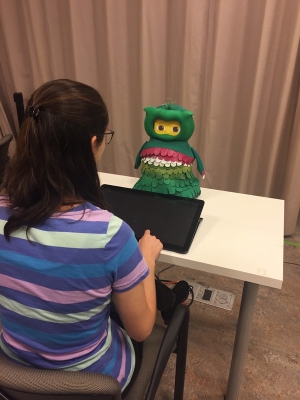The Robot in the Family
July 13, 2017 / by Vincent Lim- Research
Consumers can now interact with artificially intelligent machines in their homes through Google Home and Amazon Echo, which serve as personal assistants that answer questions, tell jokes and play music, but there is a potential for deeper human-machine connections.
A USC project funded by a grant from the National Science Foundation is exploring how robots can provide companionship and support intergenerational interactions between older adults and other family members in the same house.
Shinyi Wu, an associate professor at the USC Suzanne Dworak-Peck School of Social Work and a senior scientist at the School’s USC Edward R. Roybal Institute on Aging, is a co-principal investigator on the project and part of the research team led by principal investigator Maja Matarić, the Chan Soon-Shiong Professor of Computer Science, Neuroscience, and Pediatrics at USC, the founding director of the USC Robotics and Autonomous Systems Center and the Vice Dean for Research in the USC Viterbi School of Engineering. The project’s other co-principal investigator is Elizabeth Zelinski, the Rita and Edward Polusky Chair in Education and Aging at the USC Leonard Davis School of Gerontology. Elaine Short and Katelyn Swift-Spong, PhD students in the Department of Computer Science at the USC Viterbi School are the lead student researchers on the project.
“Robots cannot replace our closest human companions, but we’re investigating how companion technologies can facilitate and enhance existing family relationships,” Wu said.
The team is using SPRITE, a tabletop, social assistive robot developed in Mataric’s lab, that is about 30 cm tall with six degrees of freedom and an expressive face display. It is an embodied robot—designed to look like a living being—with an appearance that can be changed by modifying its covering which was designed from feedback by elderly users.
The team recently recruited multigenerational families for an exploratory study and found they enjoyed playing tablet-based games like Go Fish with SPRITE and could envision the robot in their home. Researchers hope to further develop SPRITE’s capabilities to help support the families’ social well-being.
To reference the work of our faculty online, we ask that you directly quote their work where possible and attribute it to "FACULTY NAME, a professor in the USC Suzanne Dworak-Peck School of Social Work” (LINK: https://dworakpeck.usc.edu)
